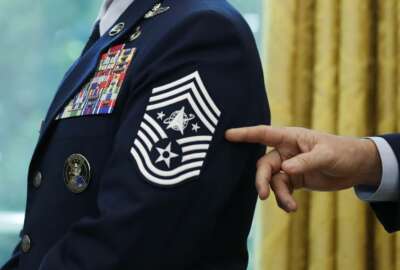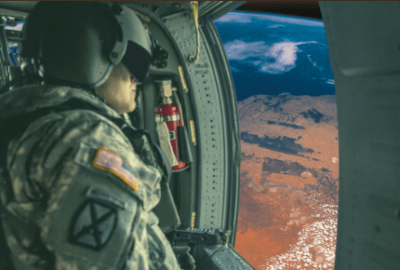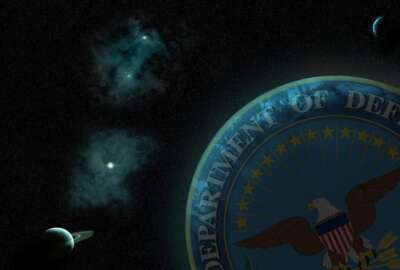Space National Guard still up in the air but lawmakers want to move forward
Senators seek to establish National Guard for space missions, correcting what they see as a "mistake" in Space Force's initial establishment.
The DoD Reporter’s Notebook is a weekly summary of personnel, acquisition, technology and management stories that may have fallen below your radar during the past week, but are nonetheless important. It’s compiled and published each Monday by Federal News Network DoD reporters Jared Serbu and Scott Maucione.
The issue of whether there should be a Space National Guard has gone back and forth between Defense officials and lawmakers for the past couple years. Now, legislators are making moves to establish a part-time component for the new service.
A bipartisan coalition of lawmakers are introducing a bill in both houses to create a Space National Guard. The effort led by Sens. Diane Feinstein (D-Calif.), Marco Rubio (R-Fla.) and Rep. Jason Crow (D-Colo.) would ensure a pipeline for guardians to work part-time and move between active duty and the Guard.
It would eliminate the need for the Space Force to route funding between it and the Air Force, and would allow the Space Force more control over Guard members who work on space functions.
Currently there are more than 1,000 Air National Guard members who perform space missions.
“Without a National Guard component for Space Force, we risk losing many talented individuals who want to keep serving their country and their states after they leave active duty, and that is simply unacceptable,” Feinstein said. “Creating a Space Force National Guard would also save money and ensure a smoother process in the event we need to activate personnel. Not establishing a Space National Guard was a mistake when Space Force was created, and this bill will remedy that.”
Not everyone is convinced that a Space National Guard is the best idea, however. Kaitlyn Johnson, deputy director of the Aerospace Security Project at the Center for Strategic and International Studies, tweeted last Friday that she thinks the component is a bad idea.
“Why would a governor ever need satellite operators to support their state/local issues? The argument that people are already doing this is not a good one — sounds like a realignment issue and not a ‘Let’s just create another bureaucratic org,’” she wrote. “What happened to the Space Force being new/revolutionary/unique? What happened to redefining how we support the space mission? Seems to me like Feinstein and Rubio are forcing the opposite values that the USSF was established on to get more money for their states.”
The Space Force itself isn’t so sure it wants a traditional Guard component. Service officials floated the idea of a “space component” last month during a Senate Armed Services Committee hearing, which would be a hybrid structure merging full- and part-time guardians.
Chief of Space Operations Gen. Jay Raymond described it as the service’s number one legislative priority.
“You could keep the Guard units in the Air National Guard and have the Air National Guard continue to provide support,” Raymond said. “Option two is you could take the men and women out of the Air National Guard and set up a separate Space National Guard. Or you can take those capabilities out of the Guard totally and put them in this one component.” — SM
Air Force missing out on DoD’s colorless money software pilots
As part of its 2023 budget, the Air Force is making a serious effort at getting in on the Defense Department’s effort to prove that budgeting for software development is very, very different from budgeting for traditional weapons systems.
As of now, the Air Force is the only military service that’s not participating in DoD’s Software and Digital Technology Pilot Program at all. And the vast majority of the Pentagon’s overall proposed increase for 2023 within the pilot effort is explained by Air Force requests to change that. The service has teed up eight potential candidates for Congressional consideration.
Under the program sometimes called the “Budget Activity 8” pilot, DoD components are allowed to use “colorless” money for software development, without having to worry about whether the phase of development they’re in should be funded by R&D, procurement or operations accounts. Critics have long argued that funding construct, intended for weapons system development, makes no sense for software and simply bogs down efforts toward agile development.
Andrew Hunter, the recently-confirmed assistant secretary of the Air Force for acquisition, technology and logistics, said his discovery that the Air Force wasn’t participating in the pilot caused him “dismay” when he assumed the new role.
“But it’s not from lack of interest,” he said during a conference hosted by the Naval Postgraduate School last week. “The Air Force submitted several candidates [in past years] to be part of the software pilot program, but we were unsuccessful in the competition for being selected. I’m rueful that we aren’t doing it. And it’s maybe slightly ironic, because I’d like to think the Air Force was a leading voice in making the case for the flexibilities required to do effective software development.”
The pilot program is only in its second year, but so far, Congress hasn’t shown overwhelming enthusiasm toward expanding it. Lawmakers didn’t approve the addition of any new programs between fiscal 2021 and fiscal 2022. The House Appropriations Committee’s version of the 2022 bill would have expanded the program, but its Senate counterpart never approved a Defense spending bill of its own.
Overall, for 2023, the Defense budget proposal would place $1.785 billion worth of DoD software programs in the BA-8 pilot, up from the $742 million Congress approved for this year. The vast majority of that increase would come from the Air Force’s proposed additions, which total $946 million.
The programs include:
- Strategic Mission Planning and Execution System ($100 million)
- Air & Space Operations Center ($178 million)
- Defense Enterprise Accounting and Management System ($136 million)
- Distributed Cyber Warfare Operations ($37 million)
- Air Force Defensive Cyber Systems ($241 million)
- All Domain Common Platform ($190 million)
- Air Force Weather Programs ($58 million)
- Electronic Warfare Integrated Reprogramming ($6 million)
USS George Washington deaths on Austin’s radar
The tragic events aboard the aircraft carrier USS George Washington are catching the attention of the nation’s top Defense official.
Defense Secretary Lloyd Austin told lawmakers last week he was concerned about the three suicides aboard the ship last month and the five in total over the past year.
“This is a really, really important issue,” Austin told the House Appropriations Defense Subcommittee. “That’s why we’re asking you for, in this budget, additional resources to help us provide greater access to our troops which includes telehealth care opportunities as well.”
About 400 sailors were living aboard the USS George Washington as it is being repaired in Newport News, Virginia. The Navy is now moving more than 250 sailors off the ship for mental health purposes and is looking at moving all the sailors to short.
“There are choices that have been made or will be made in the future in terms of how billet sailors when that repair is ongoing,” Austin said. Whether or not we made the right choices is left to be seen. Certainly there’s a problem there, we got to understand what that problem was a bit more and then we have to figure out what to do to ensure that we don’t have these kinds of problems in the future.”
Austin is waiting on two investigations from the Navy on the climate and command aboard the ship. The maintenance is taking longer than expected and the ship will be docked for another year. It was supposed to be finished this year.
“For hundreds of those sailors they have no access to housing or a car and they’re stuck on a ship. This is really demoralizing,” Rep. Marcy Kaptur (D-Ohio) said. “I am troubled by the Defense submission on the Navy because I see it getting worse. I just wanted to point a flashlight at this part of the budget and say, we got to do something and I’m not sure what it is.”
There have been seven deaths in the last year among the 2,700 sailors working aboard the ship as it is overhauling at a shipyard in Newport News, Virginia.
Five of those deaths are apparent suicides, three of which were in the space of one week last month, leading the service and others to wonder about the mental health among the Nimitz-class carrier.
The Navy is already taking some steps to address mental health concerns. It has embossed a 13-person special psychiatric rapid intervention team to provide services from April 16-19. The ship also added an additional clinical psychologist and social worker. Sailors are being given expedited appointments with mental health services on shore in Hampton Roads. Telehealth options are also available.
NBC News reported that the Navy is offering other morale boosting activities like a video game competition and soccer tournament.
However, sailors told NBC that morale remains low and some feel that the efforts are too little, too late.
Late last month, Rep. Elaine Luria (D-Va.) sent a letter to Chief of Naval Operations Adm. Michael Gilday asking for answers on conditions and climate aboard the ship.
“I am calling on the Department of Defense, the Department of the Navy, and CNO Gilday to provide the House Armed Services Committee and members of Congress with a full accounting of what steps are being taken to address command climate, safety concerns, mental health, and other issues that may have contributed to this tragic loss of life on USS George Washington,” she said. “Every member of our armed forces must be treated with respect, and we have an obligation to ensure that our active-duty personnel on USS George Washington and around the world are being heard and supported while serving our country.” — SM
Copyright © 2025 Federal News Network. All rights reserved. This website is not intended for users located within the European Economic Area.
Scott Maucione is a defense reporter for Federal News Network and reports on human capital, workforce and the Defense Department at-large.
Follow @smaucioneWFED






